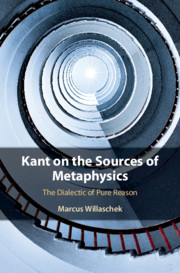Book contents
- Kant on the Sources of Metaphysics
- Kant on the Sources of Metaphysics
- Copyright page
- Dedication
- Contents
- Note on References and Citations
- Preface
- Introduction
- Part I From Reason to Metaphysics
- Part II The Other Side of the Transcendental Dialectic
- Introduction to Part II
- 6 The System of Transcendental Ideas
- 7 The Paralogisms and Antinomy Arguments as ‘Necessary Inferences of Reason’
- 8 Reason and Metaphysics in the Transcendental Ideal and the Appendix
- 9 Transcendental Realism and Kant’s Critique of Speculative Metaphysics
- Conclusion to Part II: Transcendental Illusion and the ‘Other Side’ of the Transcendental Dialectic
- Postscript
- Bibliography
- Index of Names
- Index of Subjects
6 - The System of Transcendental Ideas
from Part II - The Other Side of the Transcendental Dialectic
Published online by Cambridge University Press: 09 November 2018
- Kant on the Sources of Metaphysics
- Kant on the Sources of Metaphysics
- Copyright page
- Dedication
- Contents
- Note on References and Citations
- Preface
- Introduction
- Part I From Reason to Metaphysics
- Part II The Other Side of the Transcendental Dialectic
- Introduction to Part II
- 6 The System of Transcendental Ideas
- 7 The Paralogisms and Antinomy Arguments as ‘Necessary Inferences of Reason’
- 8 Reason and Metaphysics in the Transcendental Ideal and the Appendix
- 9 Transcendental Realism and Kant’s Critique of Speculative Metaphysics
- Conclusion to Part II: Transcendental Illusion and the ‘Other Side’ of the Transcendental Dialectic
- Postscript
- Bibliography
- Index of Names
- Index of Subjects
Summary
A central aspect of Kant’s Transcendental Dialectic is his claim that there are concepts – the transcendental ideas – that necessarily arise from rational reflection. According to Kant, these ideas of reason, like the categories of the understanding, form an a priori system. In Chapter 6, we first look at Kant’s conception of transcendental ideas and survey the system they form. Next, it is argued that Kant does not attempt to derive the transcendental ideas in questionable ways from the forms of rational inferences or the possible relations between subject, object, and representation (even though the text suggests this), but rather considers them, much more plausibly, as concepts we arrive at through rational inferences about specific (psychological, cosmological, and theological) subject matters. The central philosophical point here is that concepts can be the result of (what Kant calls) ‘necessary inferences of reason.’ A first instance of this is Kant’s derivation of the concept of the unconditioned; the chapter then turns to the three classes of transcendental ideas (psychological, cosmological, theological).
Keywords
Information
- Type
- Chapter
- Information
- Kant on the Sources of MetaphysicsThe Dialectic of Pure Reason, pp. 167 - 186Publisher: Cambridge University PressPrint publication year: 2018
